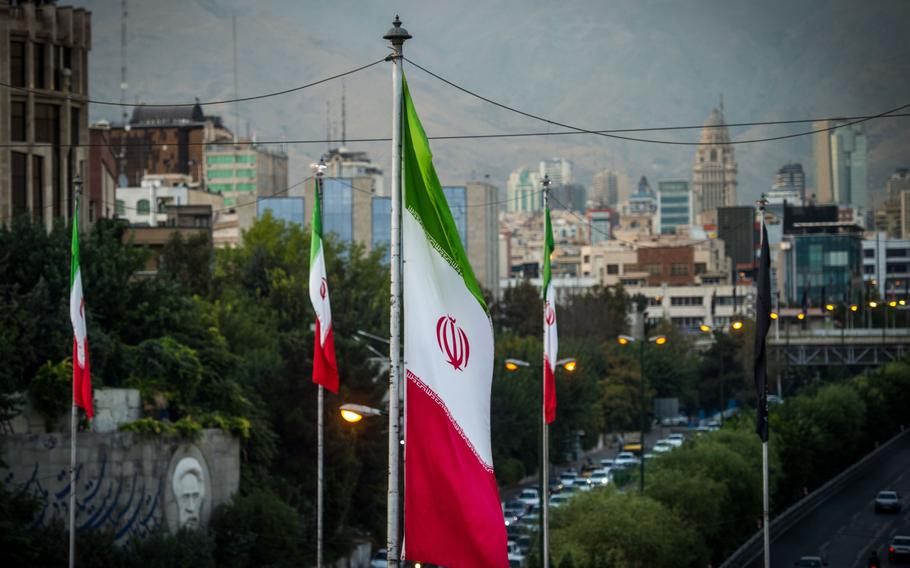
Iranian national flags fly near a major highway through Tehran, Iran, on Sept. 17. 2019. (Ali Mohammadi/Bloomberg)
Diplomacy to restore Iran’s nuclear deal with world powers is grinding to a standstill in Vienna, with neither side yet willing to take the tough political decisions required for a breakthrough.
Parties to the accord abandoned by the U.S. nearly four years ago had signaled a growing optimism that an agreement could be reached -- a mood reflected by oil markets. Yet it’s clear major differences remain on what’s required to roll back Iranian nuclear advances -- which have allowed it to enrich uranium closer to weapons grade -- in return for sanctions relief.
The focus is now shifting to a key transatlantic security meeting convening in Munich which will be attended by a high-powered U.S. delegation, according to a European official involved in the talks. Organizers of the conference say the prospects for an agreement with Iran are on the agenda.
The deal traded economic incentives for nuclear caps before the Trump administration torpedoed it and imposed sanctions, including on Tehran’s critical oil exports.
Iran has suggested a degree of flexibility over the issue of U.S. guarantees that it won’t again renege on the 2015 accord, but it’s unlikely it will be enough for Washington.
Foreign Minister Hossein Amirabdollahian has called for a “political statement” from Congress to ensure the U.S. won’t again backtrack.
“We need a serious level of guarantee,” he told the Financial Times. In lieu of legal guarantees, Iran may be willing to accept a Congressional declaration that ensures U.S. political commitments to return to and implement the agreement. Iran has won strong backing at the talks from Russia and China.
Iran has “asked for a range of options, but none of them are realistic,” said Ali Vaez, who directs Iran analysis at the International Crisis Group. A political statement would be “impossible to get from Congress,” he said.
The leader of the U.S. House of Representatives, Speaker Nancy Pelosi, will lead the congressional delegation meeting in Munich this weekend. While the California Democrat has previously called the Iran nuclear agreement a “great diplomatic” achievement, her party’s leadership over the chamber is threatened by midterm elections in November.
Opponents of the Iran agreement will also be in Munich, led by South Carolina Republican Sen. Lindsey Graham, who told the Jerusalem Post this week that a majority of representatives from both parties would oppose backing a revived deal.
“The agreement, if there is one, will have no legal effect beyond the current administration,” he said in an interview. In Munich, Graham said he’ll pitch an alternative U.S. proposal to end all Iranian uranium enrichment in exchange for sanctions relief and fuel supplies -- a proposal likely to fall flat in Tehran, which has always insisted its right to enrichment be guaranteed under any arrangement.
Oil traders appear more sanguine, boosted by signs Iran appears to be preparing for its return to international oil markets, including officials meeting with refiners from South Korea, a major buyer of Iranian crude in the past.
A return to markets for Iran, with the world’s No. 2 natural gas and No. 4 oil reserves, could help tame surging energy costs worldwide. A stalemate could add to tensions and further support crude prices that have been creeping toward $100 a barrel.
In Tehran, there are emerging signs that hardliners -- the dominant political faction in power -- are growing weary with the pace and lack of progress in the negotiations.
Last month, the reformist Shargh newspaper said Iran’s former chief nuclear negotiator, ultra-conservative Saeed Jalili, had written a lengthy letter to Supreme Leader Ayatollah Ali Khamenei criticizing Iranian negotiators in Vienna and apparently calling for Iran to withdraw from the 2015 accord entirely.
Jalili has been a vocal opponent of the deal and led a failed effort to reach a compromise with the West over Iran’s nuclear activities 10 years ago under hardline ex-President Mahmoud Ahmadinejad. He hasn’t publicly commented on the letter but the reports chime with the views of other important hardline figures who’ve in recent days been increasingly critical of the talks.
Ali Shamkhani, a former naval commander of the Islamic Revolutionary Guard Corps and secretary of the Supreme National Security Council which advises Khamenei, tweeted on Wednesday that the nuclear deal is nothing more than an “empty shell” and reiterated his belief that the U.S. and Europe can’t be trusted to abide by an agreement.
In another tweet, Shamkhani said Iran’s demands for a sanctions-removal verification and a binding guarantee against future U.S. withdrawal from the agreement were “integral,” suggesting that the country’s security establishment will not back down on a demand that Washington has repeatedly said would be impossible to provide.
- - -
Bloomberg’s Patrick Sykes and Ben Bartenstein contributed to this report.